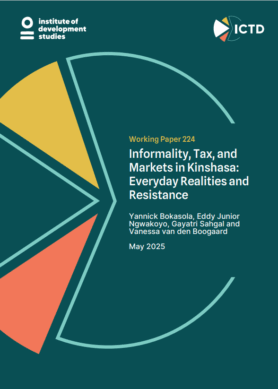Working Paper 224
This paper explores the everyday realities of taxation in Kinshasa’s markets, which play a crucial role in revenue generation and sustaining the livelihoods of the local population. Understanding market taxation in this context is critical given the plurality of state and non-state institutions and actors which govern markets and engage in revenue extraction.
The study draws on qualitative data collected from eight formal, informal, and customary markets in Kinshasa. The research documents the experiences of market vendors, their perceptions of taxation, and how these perceptions shape interactions with the state and affect their willingness to pay taxes while also capturing the variations in everyday experiences based on structural differences in market governance. We find that market vendors are subject to multiple layers of formal and informal taxation, and there is a pervasiveness of coercive tax collection practices and informality in the administration of taxes. Correspondingly, vendors widely view market-based taxation as unfair, though some likewise report greater willingness to pay informal taxes because they see tangible benefits. Formal taxes are perceived as offering few returns. In this context, everyday resistance to taxation is common, but given the vulnerable positions of most vendors and the limited channels for accountability, the paper finds few instances of a broader challenge to the tax systems or demands for reform. The study also finds distinct differences in the tax collection experiences across formal, informal, and customary markets, with market taxation led by customary authorities eliciting a greater sense of fairness and voluntary compliance.
These findings contribute to the wider literature on informal institutions and taxation, providing a case study of the everyday experiences of both market vendors and tax collectors and documenting the micro-level dynamics that shape tax morale, perceptions of fairness, and resistance in a context of pluralised tax and governance authority.
